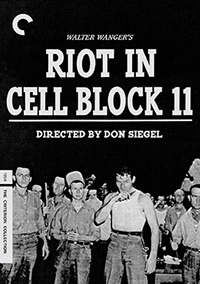 The inspiration behind the making of Riot in Cell Block 11 is as equally fascinating as the end product. Producer Walter Wanger (who famously produced Hitchcock’s 1941 film, Foreign Correspondent, among others) was sentenced to a brief stint in prison after shooting a man he believed was having an affair with his then wife, actress Joan Bennett. The dramatic scandal would force Wanger into an experience that apparently changed his life, as leaving prison immediately saw his intense interest in getting this project off the ground, basing it on an actual event that happened in Michigan. Undeniably a semi-documentary message film, it’s an arresting prison drama that features believable performances and striking cinematography. Serving as director Don Siegel’s first major hit at the box office despite lack of female stars and subject matter, it’s his first definitive example of the themes that would mark him as Clint Eastwood’s favorite director to work with in the 1970s (Dirty Harry; Two Mules for Sister Sara, etc.), man vs. corrupt societal systems.
The inspiration behind the making of Riot in Cell Block 11 is as equally fascinating as the end product. Producer Walter Wanger (who famously produced Hitchcock’s 1941 film, Foreign Correspondent, among others) was sentenced to a brief stint in prison after shooting a man he believed was having an affair with his then wife, actress Joan Bennett. The dramatic scandal would force Wanger into an experience that apparently changed his life, as leaving prison immediately saw his intense interest in getting this project off the ground, basing it on an actual event that happened in Michigan. Undeniably a semi-documentary message film, it’s an arresting prison drama that features believable performances and striking cinematography. Serving as director Don Siegel’s first major hit at the box office despite lack of female stars and subject matter, it’s his first definitive example of the themes that would mark him as Clint Eastwood’s favorite director to work with in the 1970s (Dirty Harry; Two Mules for Sister Sara, etc.), man vs. corrupt societal systems.
A rash of prison uprisings across America inspires the denizen of Cell Block 11, the punishment ward in Folsom State Prison, to follow suite and overtake the abusive and antagonizing guards. Led by tough talking criminal James Dunn (Neville Brand), right hand man Carnie (Leo Gordon) is the psychopathic madman keeping everyone in check as Dunn negotiates with sympathetic Warden Reynolds (Emile Meyer). Progress is stymied by the arrival of no-nonsense commissioner Haskell (Frank Faylen), whose views on punishment are at odds with those of the warden. Meanwhile, dissension amongst the uprising ranks becomes apparent, with the soon to be paroled Colonel (Robert Osterloh) demanding peaceful tactics be developed and that the hostage guards remain unharmed despite their proposed threats. The unbalanced Carnie, however, has alternative designs on the most brutal guard they’ve captured; a man he aims to see murdered whatever progress is made in the negotiations.
Disc Review
Even on Criterion’s DVD release, the 2K restoration of Riot in Cell Block 11 looks sharp and impressive, considering that aging prints of the film would have probably seemed incredibly grainy and deteriorated. Consider the documentary footage early on in the film, which still seems a bit decrepit despite the work that went into cleaning it up. Supplementary features are of certain interest, more notably a pair featuring Siegel’s son Kristoffer Tabori reading excerpts from both Stuart Kaminsky’s 1974 book on the director and his father’s own 1993 autobiography. Excerpts from a 1953 NBC radio documentary series The Challenge of Our Prisons feels very much like some dated program that schoolchildren would be subjected to.
Final Thoughts
By today’s standards, Riot in Cell Block 11 may seem a common prison drama, outdone by numerous examples in the decades of cinema since. But its strength lies in its simplicity. Compare this to the silliness of more recent prison uprising cinema, such as Rod Lurie’s 2001 thriller The Last Castle, which features Robert Redford and the late James Gandolfini, a film that can’t match the determination and desperation of Siegel’s outraged and divisive inmates. Shot in sixteen days, there’s a frenetic energy to Riot, which features, more than anything, a series of conversations between opposing factions. There’s nothing glamorous about the proceedings and nary a dramatic monologue in sight. Though the dialogue dips into the meat of its obvious sentiments, especially in a finale which has the warden pointedly explaining the silver linings of Dunn’s actions, it’s an uncompromising example of the law abiding citizens being censured for their neglect and abuse, treating criminals not only as humans but also victors. Filmed on location at Folsom State Prison with actual prisoners serving as extras, there’s an uneasy tension in this examination of the appalling conditions those deemed wrongdoers are forced into.


